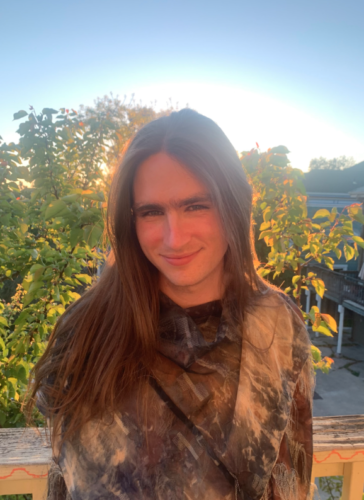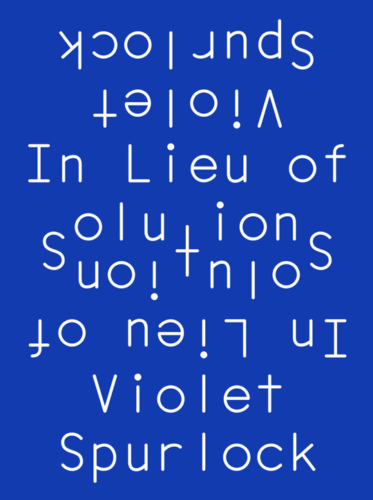We debate about my tiny titties. — You think they are getting bigger, — I think they are getting smaller. • Predictable — You say that I don’t see myself — From the side. • See, that’s an argument. —You may offer me sensory details — About how you view my profile — But I process it as evidence • (Against my perspective) — For which I am grateful.You tell me a fairy tale.A man wins and loses the love of a fairy.A range of voices, images, explanations.The central object is bread.The central action is violence.We don’t have to go too deep into analysisBecause the surface is so rich. I smileBecause I’m noting our differenceAnd it is so beautiful.Your story is completely compelling,Generous in delivering pleasure,Enough for anyone to fall in love.I write a story which is really a record of my own belief. My friend says it leaves the reader little to chew,The thoughts are so highly processedThat sensory details and experiencesHave already been refined into conclusions.I offer that it is apt for the writing to appearMore as essay than as narrative, because I often liveMy life more as essay than as narrative.My friend says well, I wasn’t gonna say it.My story is a lonely meditation,Mirroring the paucity of the reader’s life,A salve for the heartsick. — You say you can’t write in the form of a project. — I say I can’t write good descriptions. • We like each other’s writing.I read a friend’s book and it contains images. — The images are clearly allegorical, and I discern • From the passages featuring direct argument • (And my conversations with the friend) — That the images refer to ideas I am • Interested in expressing, • Compelled to express. — I like my mode of expressing ideas — And I like their mode of expressing images. • An imagined collaboration emerges as a solution. — I think, if only someone could offer me images. • Readymade, please. Ethically sourced, if possible.I know you think that the world is full of images,That inspiration is waiting outside my window,And you’re right, but you’re wrong.An image is a highly processed abstraction.Its function is to help you forget about abstraction.How is it made? We are forbidden to say.In this poem I am avoiding the use of images.Are my titties an image?Perhaps for you.And am I forced to follow my logic here,To admit that my titties are, to me,An argument, an idea, a concept?Perhaps.My titties certainly have a spectral existence.If I describe them to you, I am both extendingAnd negating the imagined space that they fill.My titties are under consideration now.If my titties develop further, — It will be due to what we call conscious choice. — This fact, • Which cannot be perceived by • Assessing the physical qualities of titties, — Would seem to give my developed — Titties a sort of special status. • Chosen titties.Would we mystify this fact by describing the titties?I began by thinking about the words that I neededBut could not give myself. — One of those words was titties. — If this word denotes an image, • And this image is supposed • To emanate from my body, — Then my body, to be described thusly, — Has a responsibility to correspond — To the word which describes it. — That is why the word, • If it is an image, — Is used. — This is the conditionality of description. • This is what I cannot bear. • This is the only way I exist.I recall asking a friend about her sex life.She said, well, my pussy doesn’t quite get hard these days. — It is important that we extrapolate no fact — About her body from this word. • It is inevitable that we will extrapolate. • If you love description, you will probably extrapolate images. • Hopefully you know how to do so lovingly, generously.I love my friend’s pussy because it sang to me of a hidden power. • I am not talking about my friend’s body. • We spoke on the phone.I love my friend’s pussy because a word was made different in response to a need. — The word, pussy, fit as naturally into the sentence as any other. • The sentence described a change in the quality of an entity over time. • The sentence reformulated the shape of an image. — But the sentence saved me because — It articulated a form of life. — A life in which the words we use are the words we need.I love my friend’s pussy because I cannot speak its name without getting free.
Epidermal Ripple Pools
Feature Date
- May 3, 2024
Series
Selected By
Share This Poem
Print This Poem
“Epidermal Ripple Pools” from IN LIEU OF SOLUTIONS: by Violet Spurlock.
Published by FuturePoem Books on November 15, 2023.
Copyright © 2023 by Violet Spurlock.
First published in Arc Poetry Magazine.
All rights reserved.
Reproduced by Poetry Daily with permission.

Violet Spurlock is a writer living in the Bay Area. Her published works include Alloyed Bliss (Eyelet, 2021) and VS VS VS (Gauss PDF, 2021). In addition to writing poetry, she also facilitates a writing group for trans authors and is currently at work on a novel. In Lieu of Solutions is her first full-length book.
"A crash course in 21st century gender trouble, I have been waiting for a book like this forever, one that I could give to an ex-girlfriend, a secret crush, or a future self. Expansive, layered, unimpeachable, I sort of forgot poems could be like this–giddy, 'prone to dizziness,' and yes, a little reckless, but mainly in the way that it imagines the ontological realness of having titties while shamelessly flirting with the dialectic."
—Lara Mimosa Montes
"It is brave and bold to use the beautiful ferocity of your intelligence to rewrite the world. This is what Violet Spurlock has given us with In Lieu of Solutions. The poems in this book perform miracles of clarity in situations where there is no clarity. They analyze to survive and share the process of analyzing as a generosity of spirit. They dare to say what the fuck things are when the dinner turns into a death cult potluck, when the canto takes a fascist turn, when the doctor demands your numbers in exchange for care. Spurlock knows that this is what language, the poem, is for–and I am roused by it."
—Stacy Szymaszek
"This stunning debut collection by Violet Spurlock, a poet trained as a philosopher, is a trans ars poetica for our zeitgeist. Via a dazzling array of poetic forms, linguistic permutations, and neologisms Violet gives us an eye into the unresolved yet re-solving conundrum of being trans and a poet. Of transitioning but not transitioning yet. Waiting to transition. Having already transitioned and monitoring the size of one's "titties"–so that rather than solutions, there is a way to live. A way towards life. A way of life. And the way is through poetry. 'A word was made different in response to a need,' she writes. And every word is spot on."
—Julian Talamantez Brolaski
Poetry Daily Depends on You
With your support, we make reading the best contemporary poetry a treasured daily experience. Consider a contribution today.




